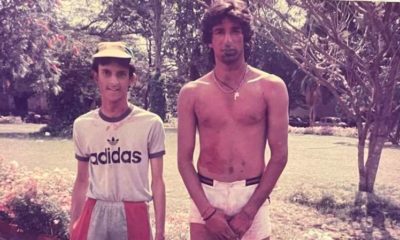World
Pakistan, Iran look to revisit gas pipeline agreement
Islamabad: Pakistan has shared with Iran amendments to gas sale and purchase agreement (GSPA) to extend implementation schedule and revise pricing under the $1.35-billion gas pipeline project. A senior government official on Thursday told Dawn that the Economic Coordination Committee (ECC) of the Cabinet has not yet allowed the Ministry of Petroleum and Natural Resources to start formal negotiations with Iran over fresh pricing.
He said the ministry requested the ECC in July this year to revive a committee to start formal talks and “we are still waiting for the approval”. The petroleum ministry told parliament a few days ago that for the Iran-Pakistan (IP) project to be implemented in the extended period, “amendment to the GSPA was required”. It said a draft amendment had been shared with Tehran that agreed to negotiate it along with some other changes.
The official explained that the two key amendments were required to be made in the GSPA that had been “under suspension” for a few years. These proposed changes related to extension in timelines under the original agreement Pakistan should have completed the pipeline on its side by Dec 31, 2014 and gas flows should have started with effect from Jan 1, 2015.
Secondly, the pricing formula has to be revised based on latest market situation, prevailing prices from competitive sources and international best practices. Both Tehran and Islamabad wanted extension in dates and prices that would trigger a series of actions in line with best international practices.
The talks on the project were revived after a few years of suspension in March this year during the Iranian president visit to Pakistan. The two sides agreed to GSPA amendment for extension of time to finalise workable implementation schedule, price negotiation as per review clause in GSPA and Iranian proposal regarding amendments to the GSPA. Iran has told Pakistan that the pipeline segment on the Iranian side will take about one-and-a-half years to complete.
Pakistan has stressed the need for setting the right timelines targeting early completion yet adequate provisions and flexibility for long-term measures and all eventualities towards achieving an amiable financial closure and construction. Pakistan is currently building the 700-kilometre Gwadar-Nawabshah gas pipeline through Chinese assistance.
National
Foodman Vishal Singh Honored for Hunger Free World Mission in Bangkok

Lucknow: Vishal Singh, a renowned social worker from Lucknow, also known as Foodman, has once again made India proud. He was honored by the Happy Hands Gloves Cooperative Limited Company in Korathai, Thailand, for his work with the Hunger Free World Mission.
The Hunger Free World Mission’s meeting was held in Korathai, Thailand, under Vishal Singh’s leadership. Representatives from several countries, including Mr. Raja Dwivedi (Managing Director of Happy Hands Gloves Limited), Thailand Coordinator Mr. Raja Mishra, and member Mr. Varun Singh, attended the event.

Under Vishal Singh’s leadership, the attendees took a pledge to work together toward creating a hunger-free world.
Speaking on the occasion, Vishal Singh explained that the main goal of the Hunger Free World Mission is social participation. He said the mission is not just about feeding people but also about meeting other basic needs of those who are struggling. The mission focuses on helping families of terminally ill patients in hospitals by providing food and shelter. It also works to fulfill essential needs like education, jobs, and care for the elderly.
For the last 16 years, the Vijay Sri Foundation has been providing free services, benefiting thousands of people. Vishal Singh highlighted that the mission aims to gain global recognition like other organizations such as WHO, WWF, and Red Cross, which work for social causes.
During this meeting, Vishal Singh was appointed as the Chairman of the Hunger Free World Mission by representatives from various countries. They also discussed holding regular meetings in different countries to push the mission forward.
Business tycoon Dr. Abhishek Verma has also supported this humanitarian mission, vowing to promote the idea of “Seva Parmo Dharma” (Service is the highest duty) worldwide. Vishal Singh praised him, stating that people like Dr .Abhishek Verma inspire others to work for the betterment of society.
Recently, Romania’s Ambassador, Mr . Daniela Sezonov Ţane, invited Vishal Singh to the Romanian Embassy in Delhi, where they discussed the mission in detail. Impressed by his humanitarian work, she honored Vishal Singh and invited him to Romania to take the mission forward .
Food man Vishal Singh has been serving the people of India for the past 16 years. Through the Vijay Sri Foundation, he provides free meals to cancer patients & their families ,shelter, and education for women & children along with running free old-age homes in Lucknow.
In addition to his humanitarian work, Vishal Singh also addresses issues like crime and corruption through his role as Chairman of Seva Path Media and Managing Director of Vijay Sri Foundation.

During the COVID-19 pandemic, Vishal Singh and his team worked tirelessly to provide food and help to the needy, including starving children, elderly citizens, and pregnant women. Despite contracting the virus himself, he continued to assist others after his recovery. He even created a life-saving oxygen regulator using household items, which was praised by doctors both in India and abroad.
In his address at the meeting, Vishal Singh spoke about his mission to create a hunger-free world. He pointed out that India’s large population, along with issues like unemployment and poverty, has caused the country to fall on the Hunger Index. He urged people to contribute just one handful of grains daily to help create a hunger-free world.
He concluded by saying that through social participation, we can empower the people around us, meet their basic needs, and work together to build a stronger, more prosperous, and developed society.
























